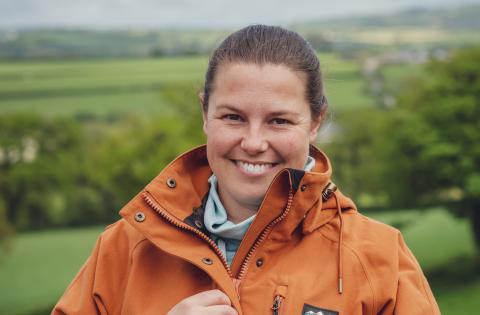Agriculture graduate Jamie and her partner purchased a mixed family-owned farm in Ceredigion in 2011. Predominantly a 200 strong block calving dairy enterprise, this entrepreneurial couple have set up other diversified enterprises, despite Jamie having a full-time job within the industry. They pasteurise milk sold through vending machines; have 250 commercial ewes; a PYO pumpkin enterprise, a successful Airbnb venture and a forestry scale wood-chipper supplying biomass. Jamie is determined to improve profitability of the business, while improving its environmental and community legacy.
“We need to add value to milk, meat, vegetables, fibre such as wood and wool and tourism opportunities, so I aim to learn more about short supply chains which operate from the farm gate, to keep ahead of the European curve and meet the ever-changing needs of farmer and consumer.”
EXECUTIVE SUMMARY
Opportunities identified to expand role of vending machines in farm produce sales
Vending machines stocking a range of farm produce, not just milk, could become part of future shopping culture in Wales.
In the Netherlands and Austria, these machines are commonly used for stocking cheese, butter, eggs, yoghurt, German sausage and pate-style products as well as milk, according to research by Ceredigion dairy farmer Jamie McCoy.
Ms McCoy who, with her partner, Deian Evans, recently diversified into selling pasteurised ‘Llaeth Gorwel’ milk through vending machines in Newcastle Emlyn and Cilgerran, visited these countries during a Farming Connect Management Exchange Programme study of supply chains.
She discovered that vending machines could offer a 24 hour service in the right location - renting that space offered a much cheaper alternative to renting an entire shop.
“This was one of the main advantages discussed with many businesses in both the Netherlands and Austria, and I saw occasions where neighbouring farmers were hosting each other’s machines in order to increase the number of product lines available at each place, and therefore become a better draw for customers,’’ she reports.
“For those located in strong tourist areas they mentioned that as people arrive at self-catering cottages often they don’t carry supplies with them, and will stop off for breakfast or dinner supplies from a local vending machine as they check-in.’’
Machines are stocked appropriately to cater for this.
Ms McCoy also visited farm shops and noticed differences to those operating in Wales – many opened only on a Friday and Saturday.
These limited hours didn’t affect sales, instead concentrating them into a shorter period while allowing for stock wastage to be reduced and for the business to operate at lower staffing levels.
It also meant that the owners could attend events and fairs.
“One message which came across particularly strongly in the Netherlands was about carefully planning your time,’’ says Ms McCoy.
But for farmers planning diversification, she suggests that these activities should only be established to complement existing enterprises, and must spin from a strong base.
“Experience has shown that those which are started in attempt to support a struggling business are less likely to succeed,’’ she says.
Direct selling challenges she has encountered in the Gorwel Farm diversifications include finding cost effective and available packaging and identifying and accessing customers.
The study had left her with a wide range of ideas to develop - some had already been implemented including purchasing a second-hand vending machine to increase products available.
Fridge capacity had been increased too as the opportunity arose to further develop the Llaeth Gorwel customer base.
Connections had been made with three other local food producers to explore opportunities for collaborative working.
Some of the key findings from Ms McCoy’s study include understanding that it is acceptable to charge a fair price for a farm product
She also concludes that short supply chains can be rewarding for both producer and customer.
But opening hours need to fit in with the business and life commitments.
“Make the most of the customers you have access to, and specifically cater to their needs,’’ she advises.
She also believes that the links between the tourism industry and agriculture can be better exploited in the food and drink sector.
MANAGEMENT EXCHANGE REPORT


